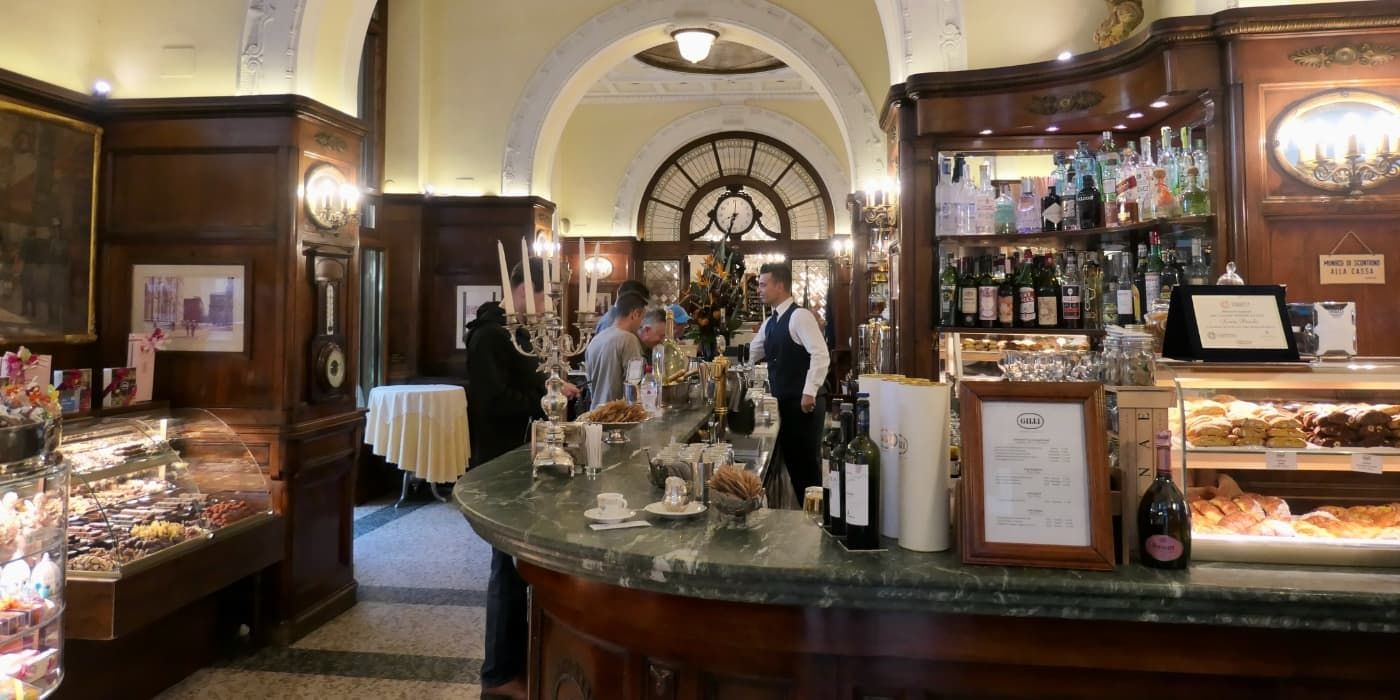The historic cafes of Florence immediately evoke an atmosphere of elegance and tradition. Strolling through the streets of the city center, amongst frescoed buildings, historic squares, and famous monuments that recall the Renaissance, from the Vasari Corridor to the masterpieces housed in the Uffizi, it is not uncommon to spot ancient signs of bars and to catch glimpses, through the glass windows facing the street, of marvelous interiors decorated with shiny mirrors, wooden walls, and refined stuccoes. Entering such well-kept environments for a coffee or hot chocolate thus becomes an added value to the day.
The timeless charm of the historic cafes of Florence
Entering the historic cafés of Florence may seem like just a simple stop at a bar, but in reality, once you cross the threshold, your gaze is irresistibly captured by the beauty of the surroundings, and your eyes lose themselves in the exquisite details. These historic cafés of Florence, icons of Italian style, envelop you in an atmosphere rich in charm stemming from centuries of history, art, and tradition, offering you a unique experience that combines culture and timeless taste.
Explore Florence with Florence PassHow and when the historic cafes of Florence were born
The first historic cafés of Florence were born in the early 18th century, at a time when drinking coffee was much more than a daily habit: it represented a true social ritual. Within these elegant rooms, carefully furnished, artists, writers, politicians, and intellectuals would meet to discuss art, literature, and ideas. In short, they were places where cultural ferment was in the air, where the aroma of coffee mingled with the voices of conversations.In these venues friendships, loves, and debates were born that probably marked an era, transforming Florentine cafes into true icons of Italian style.
Historic cafés of Florence: which are they?
Caffè Gilli
Founded in 1733, it moved to Piazza della Repubblica in the 1920s. Its Belle Époque interior is a rare surviving example in Florence. It still preserves original furnishings such as the marble counter, the neoclassical bronze decorations crafted by the Coppedè workshop, and stucco-molded ceilings. Known for its fine pastries and premium coffee blends.
Address: Piazza della Repubblica, 36R
Le Giubbe Rosse
Opened in 1897 as a beer hall, it soon became a meeting place for Futurists and leading intellectuals. Its name comes from the waiters’ red jackets, inspired by Viennese style. The walls are literally covered with period photographs, drawings, writings, and mementos that capture the cultural vibrancy of the time. Recommended for coffee, aperitifs, and traditional Tuscan dishes.
Address: Piazza della Repubblica, 13/14R
Caffè Concerto Paszkowski
Opened in 1846 as a beer hall and transformed into an elegant café-concert venue in 1904, it soon became a hub for writers and artists in the early 20th century. Inside you’ll find Art Déco furnishings, fine wood paneling, and refined tea rooms dating back to the late 19th and early 20th centuries. Declared a National Monument in 1991. Famous for coffee and cocktails accompanied by live music. Specializes in international pastries and refined dishes.
Address: Piazza della Repubblica, 31R
Procacci
A small venue awarded the title of Royal Warrant holder in 1925. It still retains its Liberty-style floor and early 20th-century furnishings. Best known for its signature truffle sandwiches, it also offers a fine selection of wines and champagne.
Address: Via de’ Tornabuoni, 64R
Caffè Rivoire
Founded by Enrico Rivoire as a “steam-powered chocolate factory,” it became famous for its hot chocolate and early 20th-century furnishings. Today it is also a cocktail bar and restaurant overlooking Palazzo Vecchio, renowned for luxury pastries and pralines.
Address: Piazza della Signoria, 5R
The elegance of the historic cafés of Florence.
Today, visiting the historic cafes of Florence means entering them mainly to experience an immersive journey into history and elegance, to imagine the cultural fervor that once animated them. In fact, each in its own way, with traces left in the furnishings and decorations, testifies to centuries of intellectual and artistic life, and probably even to memorable encounters, showing how these spaces have become true symbols of the Italian lifestyle. Walking through their rooms is a way to observe the city from an unrepeatable historical period, to be preserved and passed on to new generations.
About the author
Written on 10/09/2025




Giacinta Navarra
Discover how Florence’s historic cafés tell stories of elegance, art, and tradition, becoming symbols of the true Italian lifestyle.